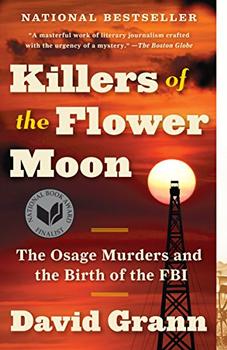Summary | Excerpt | Reviews | Beyond the Book | Readalikes | Genres & Themes | Author Bio

The Osage Murders and the Birth of the FBI
by David Grann
By 1921, they had a daughter, Elizabeth, who was two years old, and a son, James, who was eight months old and nicknamed Cowboy. Mollie also tended to her aging mother, Lizzie, who had moved in to the house after Mollie's father passed away. Because of Mollie's diabetes, Lizzie once feared that she would die young, and beseeched her other children to take care of her. In truth, Mollie was the one who looked after all of them.
May 21 was supposed to be a delightful day for Mollie. She liked to entertain guests and was hosting a small luncheon. After getting dressed, she fed the children. Cowboy often had terrible earaches, and she'd blow in his ears until he stopped crying. Mollie kept her home in meticulous order, and she issued instructions to her servants as the house stirred, everyone bustling about—except Lizzie, who'd fallen ill and stayed in bed. Mollie asked Ernest to ring Anna and see if, for a change, she'd come over to help tend to Lizzie. Anna, as the oldest child in the family, held a special status in their mother's eyes, and even though Mollie took care of Lizzie, Anna, in spite of her tempestuousness, was the one her mother spoiled.
When Ernest told Anna that her mama needed her, she promised to take a taxi straight there, and she arrived shortly afterward, dressed in bright red shoes, a skirt, and a matching Indian blanket; in her hand was an alligator purse. Before entering, she'd hastily combed her windblown hair and powdered her face. Mollie noticed, however, that her gait was unsteady, her words slurred. Anna was drunk.
Mollie couldn't hide her displeasure. Some of the guests had already arrived. Among them were two of Ernest's brothers, Bryan and Horace Burkhart, who, lured by black gold, had moved to Osage County, often assisting Hale on his ranch. One of Ernest's aunts, who spewed racist notions about Indians, was also visiting, and the last thing Mollie needed was for Anna to stir up the old goat.
Anna slipped off her shoes and began to make a scene. She took a flask from her bag and opened it, releasing the pungent smell of bootleg whiskey. Insisting that she needed to drain the flask before the authorities caught her—it was a year into nationwide Prohibition—she offered the guests a swig of what she called the best white mule.
Mollie knew that Anna had been very troubled of late. She'd recently divorced her husband, a settler named Oda Brown, who owned a livery business. Since then, she'd spent more and more time in the reservation's tumultuous boomtowns, which had sprung up to house and entertain oil workers—towns like Whizbang, where, it was said, people whizzed all day and banged all night. "All the forces of dissipation and evil are here found," a U.S. government official reported. "Gambling, drinking, adultery, lying, thieving, murdering." Anna had become entranced by the places at the dark ends of the streets: the establishments that seemed proper on the exterior but contained hidden rooms filled with glittering bottles of moonshine. One of Anna's servants later told the authorities that Anna was someone who drank a lot of whiskey and had "very loose morals with white men."
At Mollie's house, Anna began to flirt with Ernest's younger brother, Bryan, whom she'd sometimes dated. He was more brooding than Ernest and had inscrutable yellow-flecked eyes and thinning hair that he wore slicked back. A lawman who knew him described him as a little roustabout. When Bryan asked one of the servants at the luncheon if she'd go to a dance with him that night, Anna said that if he fooled around with another woman, she'd kill him.
Meanwhile, Ernest's aunt was muttering, loud enough for all to hear, about how mortified she was that her nephew had married a redskin. It was easy for Mollie to subtly strike back because as one of the servants attending to the aunt was white—a blunt reminder of the town's social order.
Excerpted from Killers of the Flower Moon by David Grann. Copyright © 2017 by David Grann. All rights reserved. No part of this excerpt may be reproduced or reprinted without permission in writing from the publisher.
Your guide toexceptional books
BookBrowse seeks out and recommends the best in contemporary fiction and nonfiction—books that not only engage and entertain but also deepen our understanding of ourselves and the world around us.